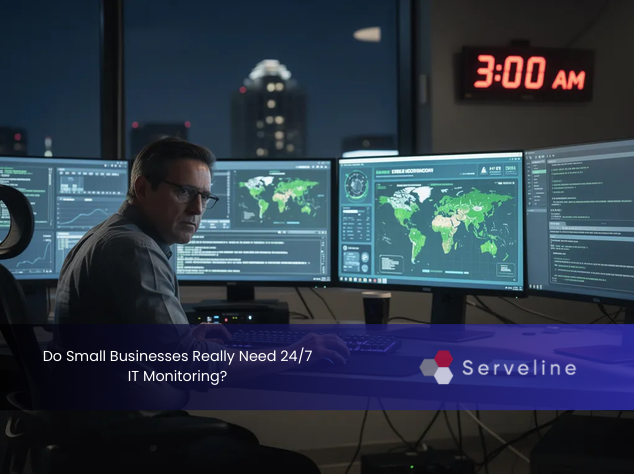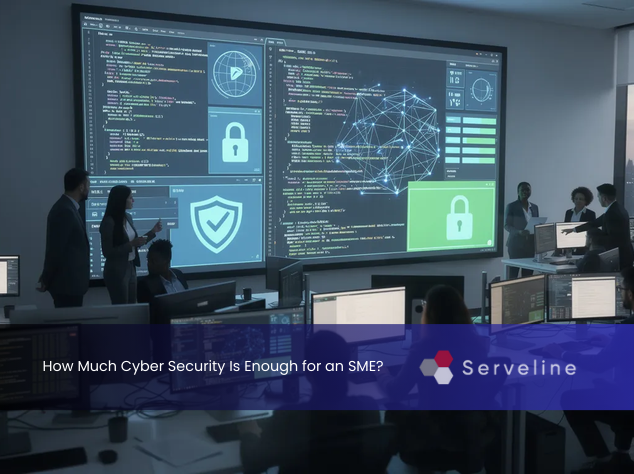
As data breaches and cyber threats loom larger, the security of your business’s information systems can’t be overlooked. Whether you're a growing startup or an established small business, having a dedicated IT security consultant can be the difference between staying safe and falling victim to cybercrime. But what exactly does a security consultant do, and how can they fortify your business against evolving threats?

Understanding the role of IT security consultants
The role of an IT security consultant is to safeguard the digital assets of a business from the myriad of cyber threats that exist today. But their responsibilities extend far beyond just setting up firewalls or installing antivirus software. These professionals perform a critical analysis of your business’s security architecture, identify vulnerabilities, and devise custom strategies to mitigate risks.
During an IT consultation, a consultant assesses your existing security measures and aligns them with industry best practices and compliance requirements. From risk management strategies to cloud security solutions, they ensure your business's defences are robust and resilient. They also keep a vigilant eye on the evolving landscape of cybersecurity threats, enabling your business to stay one step ahead of potential attackers.
For small businesses in particular, where IT resources might be limited, an IT security consultant acts as an extension of your team. They bring specialised knowledge and skills that might otherwise be inaccessible, providing peace of mind and freeing up your resources to focus on growth and operations.
Risk assessment: The first line of defence
Risk assessment forms the backbone of effective cybersecurity. For businesses, particularly smaller ones with potentially limited cyber defences, understanding the specific threats they face is critical. An IT security consultant plays a pivotal role here by conducting thorough risk assessments that identify which parts of your business are most vulnerable to cyber attacks.
These assessments aren’t just about finding weaknesses; they are about understanding the potential impact of different types of cyber incidents on your business operations. Whether it’s data theft, system outages, or compliance penalties, each risk is quantified to prioritise response strategies. This thorough evaluation helps businesses allocate their limited resources more effectively, ensuring that they protect not just their data but also their reputation and operational capability.
Moreover, a risk assessment is an ongoing process, not a one-off event. As new technologies emerge and cyber threats evolve, the consultant will continually reassess and update the security strategies to defend against potential new vulnerabilities.

Strategic security planning and implementation
Once the risk assessment is complete, the next critical step is strategic security planning and implementation. An IT security consultant is instrumental in translating the insights gained from risk assessments into actionable security policies and protocols.
This stage involves designing a tailored security strategy that addresses the specific needs and goals of your business. It could include implementing security controls like access management systems, encryption techniques, firewalls, and intrusion detection systems. The consultant will also recommend security solutions that align with your business's size, budget, and industry-specific requirements.
Effective implementation also requires a hands-on approach to integrate these systems seamlessly with your existing IT infrastructure. A security consultant ensures that these implementations are carried out smoothly, with minimal disruption to day-to-day operations. They also provide training for your staff to manage these new systems effectively or can manage them on your behalf.
Moreover, strategic security planning isn't just about installing hardware and software. It's about embedding security best practices into every layer of your organisation, from the boardroom to the front lines, ensuring that every employee understands their role in maintaining the security posture of the company.
Regular security audits and continuous monitoring
An integral part of sustaining a secure IT environment is the continuous assessment of the implemented security measures. An IT security consultant ensures that your business doesn't just set up security protocols but also maintains them effectively through regular security audits and continuous monitoring.
Security audits are thorough inspections of your existing security setup. They evaluate how well your security policies and controls are holding up against the demands of the real world. These audits help identify any lapses or weaknesses before they can be exploited by malicious entities. By systematically addressing these vulnerabilities, your business can reinforce its defences continuously.
Moreover, continuous monitoring allows for the real-time tracking of security events and potential threats. This proactive surveillance is crucial in detecting unusual activities that could indicate a security breach. With advanced cybersecurity tools, a security consultant can provide insights into the health of your IT systems, enabling swift action against threats.
This continuous approach not only helps in immediate threat detection and response but also contributes to a culture of security within the organisation. It ensures that security remains a top priority and is not just considered a one-time setup but a vital, ongoing process.

Training and empowerment: Building a security-minded culture
Today, technology alone is not enough; the human element is equally crucial. An IT security consultant plays a key role in educating and empowering your team to be the first line of defence against cyber threats.
Training programs designed by security consultants focus on raising awareness about common cyber threats like phishing, ransomware, and social engineering attacks. These educational initiatives ensure that every employee understands the signs of suspicious activity and knows how to react appropriately. This is especially important for non-technical staff who might not be aware of the sophisticated tactics used by cybercriminals.
Empowerment comes from providing the tools and knowledge necessary for employees to take proactive steps in safeguarding their work environment. A security consultant can develop custom training modules tailored to the specific needs of your business, ensuring that security protocols are understood and adhered to by all.
Moreover, fostering a security-minded culture goes beyond formal training. It involves creating an environment where security is considered a shared responsibility. Encouraging open communication about potential security concerns and ensuring that security practices are integrated into daily operations can significantly enhance the overall security posture of your business.
Final thoughts
The security of your business’s data and IT infrastructure is paramount. Hiring an IT security consultant is not just a strategic decision; it's a necessary safeguard for the continuity and growth of your business. These professionals bring a wealth of knowledge and expertise that can transform your IT security from a potential liability into a robust, proactive defence mechanism.
For small business owners in Kinver, the personalised and expert support from a consultant ensures that your business is not only protected against current threats but is also prepared for future challenges. With 94% SLA compliance and a customer-centric approach, Serveline offers comprehensive IT security consultancy services that cater to the unique needs of SMEs across the UK.
If you're ready to take the next step in securing your business or if you simply want to explore your options, we are here to help. Let us take the stress of IT security off your shoulders so you can focus on growing your business with confidence.
Frequently asked questions
What certifications should a cybersecurity consultant have?
In the field of cybersecurity, certifications are essential indicators of a consultant's expertise and commitment to the industry. Common certifications include ISO/IEC 27001 for information security management, CISSP for advanced information security, and CompTIA Security+ for foundational security skills. These certifications help ensure that the cybersecurity consultant you hire is equipped with the latest knowledge and practices.
How does cybersecurity protect my business?
Cybersecurity measures are crucial in defending against security threats like data breaches, hacker attacks, and other cyber crimes. A robust cybersecurity strategy involves proactive incident response, regular security audits, and continuous monitoring to safeguard your information technology infrastructure.
How can cybersecurity consultancy benefit public sector organisations?
Public sector organisations often handle sensitive data and face strict regulatory requirements. A cybersecurity consultant can provide specialised security consultancy services to ensure compliance with regulations like GDPR and help implement security measures that protect against both internal and external threats.
What skills are essential for a security analyst in 2025?
As we move towards 2025, a security analyst must have a strong understanding of cyber security, information security, and emerging technologies like hybrid work environments. Additionally, skills in security incident response and the ability to work with advanced security operations technologies are crucial.
Can a small business afford cybersecurity services?
Absolutely. While many small businesses worry about the cost of cybersecurity services, the reality is that the expense of not protecting your business can be much higher. Many cyber security consultants offer scalable solutions tailored to the size and budget of SMEs, ensuring that you receive protection that is both effective and affordable.







.avif)

